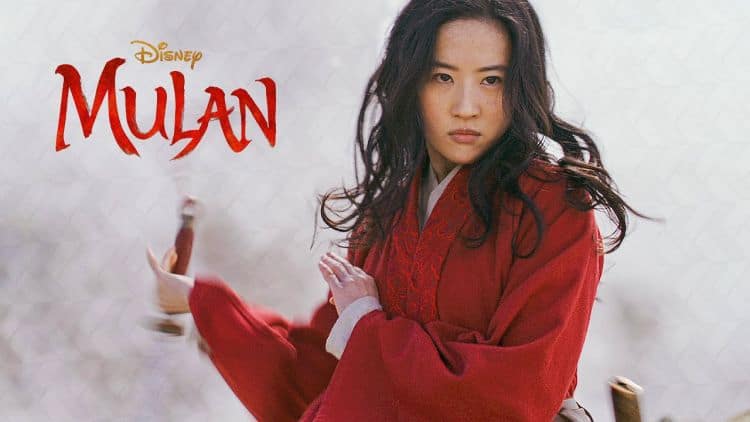I have no idea what is going on with Disney at the moment. They are on a kick about taking their classics from the “Disney Renaissance” (A period of time from 1989 to 1999 where most of the best Disney animated films came from) and making them into live-action remakes that go from “meh” to “ok” on the popular rating scale.
While some remakes have been interesting enough with a few tweaks here and there (Aladdin) to be passable, to just a 100% retelling of the same movie with worse acting (Beauty and The Beast / The Lion King), Disney seems to want to do these things again without using the same magic that made them classics in the first place, with Mulan being the most obvious “How not to remake a film” of them all.
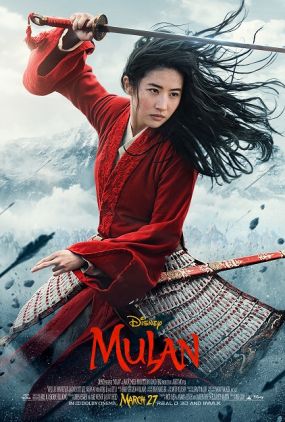
Production Company: Walt Disney Pictures
Distributed by: Walt Disney Pictures
Directed by: Niki Caro
Produced by: Chris Bender, Tendo Nagenda, Jason T. Reed, & Jake Weiner
Written by: Rick Jaffa, Amanda Silver, Lauren Hynek, & Elizabeth Martin
Starring: Liu Yifei, Donnie Yen, Jason Scott Lee, Yoson An, Gong Li, & Jet Li
Based on: Disney’s Mulan by Tony Bancroft & Barry Cook, Ballad of Mulan by Guo Maoqian
Release dates: September 4, 2020 (Worldwide)
Running time: 115 minutes
Rating: PG-13 (United States) / PG (Australia)
The Journey of A Thousand Steps…
In imperial China, Hua Mulan is an adventurous and active girl, to the disappointment of her parents, who hope that one day she will be wed to a good husband. As a young woman, Mulan is forced to meet with a matchmaker to demonstrate her fitness as a future wife. Mulan, flustered, attempts to pour tea in front of the matchmaker, but a spider causes her to knock over the kettle and the matchmaker calls her a disgrace in front of her family.
To the north, an imperial outpost is invaded by Rouran warriors, under the leadership of Böri Khan. They are assisted by the witch Xianniang, who uses her magic to pose as a surviving soldier and report the attack to the Emperor of China; he then issues a conscription decree ordering every family to contribute one man to fight Khan’s forces.
Imperial soldiers arrive in Mulan’s village to enlist recruits and her elderly and frail father Hua Zhou is forced to pledge his service as he has no sons. Realizing that her father has no chance of survival, Mulan flees with his armor, horse, and sword to join in his place. Mulan arrives at the training camp, which is run by Commander Tung, an old comrade of Hua Zhou. Alongside dozens of other inexperienced recruits, she ultimately becomes a trained soldier under his tutelage without exposing her true identity.
The Khan’s army continues to advance, forcing Tung to end training early and send his battalion to fight. Mulan chases some troops on her own but is confronted by Xianniang, who mocks her for pretending to be a man. She attempts to kill Mulan but flees when her attacks are stopped by Mulan’s leather armor. Mulan removes her male disguise, returning to the battle just as the Rourans begin attacking her fellow troops with a trebuchet. Mulan uses discarded helmets and her archery skills to maneuver the trebuchet into firing on a snowy mountain, triggering an avalanche that buries the Rourans.
Mulan rides back to camp and rescues Chen Honghui, a soldier she befriended in camp. Unable to hide her true gender any longer, she is expelled from the army and begins her return home. On her way, she is confronted by Xianniang, who reveals that she was also shunned by her people and fights for Böri Khan only because he treats her as an equal. Additionally, she reveals that the attacks on the outposts have been a diversion, as Khan’s true plan is to capture and execute the Emperor for having his father killed. Risking execution, Mulan returns to her battalion to warn them of the impending capture. Tung decides to believe her and allows her to accompany a unit to the Emperor’s palace.
Xianniang, posing as the Imperial Chancellor, persuades the Emperor to accept Böri Khan’s challenge to single combat while removing the city guard from their posts. The guards are murdered, and the Rourans prepare to burn the Emperor alive. Mulan’s unit distracts the Rourans while Mulan goes to save the Emperor. Khan tries to snipe her with an arrow, but Xianniang, sympathetic to Mulan and disenchanted with Khan, transforms into a bird and sacrifices herself by catching the arrow. Mulan kills Khan, but not before he disarms her and destroys her father’s sword. She frees the Emperor, who offers to let her join his personal guard. She declines the offer and returns to her village.
Mulan is reunited with her family. An emissary from the Emperor, under the leadership of Commander Tung, arrives to present Mulan with a new sword, while making a personal request that she join the Emperor’s Guard.
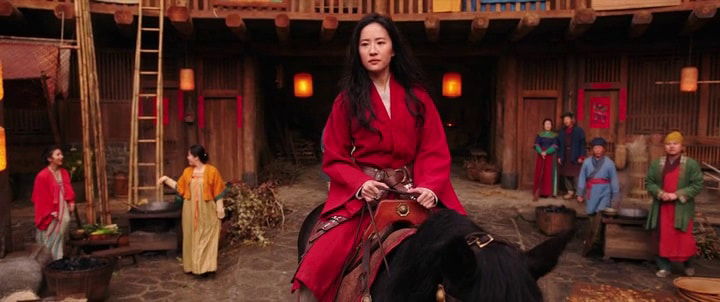
Authentic As Possible
With a film like Mulan, the first thing people are going to look at is how authentic the tale, characters, casting, and everything is to the Chinese culture. From a Western perspective, Mulan did one of the better casting choices than any other version of the story that is available, and that includes the animated version. Just about everyone from the main characters, sub-characters, and even background characters are either native Chinese people or at minimum, Asian-American as a race, giving Mulan that proper look and feel that usually comes from films made exclusively in China for a Chinese audience… If we forget about the white director at the helm.
The use of Chinese legends like Donnie Yen as Commander Tung, and Jet Li as The Emperor of China shows that Disney knew what they were doing when casting main tier characters who are central to the story. Yen is a standout with his martial arts being on full display during the training scene, but then gets shoved aside for Mulan to take over after that. Even Li was a standout as the serious version of the Emperor who can still mix it up when needed to protect his city and people (It was nice to even see small action scenes with Li in action again since he retired from fighting or action scenes due to an enlarged heart in 2005). Though having these martial arts legends available only to have them sit back for Mulan to take the whole spotlight for a majority of the film is a waste of star power.
While the choice of heroes had the very detailed and grand look of riches and prosperity, the other side of the “Let’s not call them Mongolian” Rouran army which is a group of dirty, scarred, dark dressed men who hang around in unfinished buildings filled with dirt and stone that makes them look like a down-trodden lower class. It’s the use of visual mediums like this that really paints a line between the two sides that goes deeper than Bori Khan’s personal vendetta against the Emperor about killing his Father. It might be more subtle than first thought, but it gives a credit to how things are shown on screen. Extra credit to Jason Scott Lee for showing this in his words and actions as Bori Khan.
Speaking of the characters who are more complex than they look, Gong Li as the Witch Xianniang is a real stand out performance for a character who was added to the film to give more females screen time. Her character is a complex mix of good and bad that comes from the way she was treated because, much like Mulan, she was a female who had incredible Qi and used it to go against a system of oppression that made her become an outcast. When she meets Mulan and notices a kindred spirit, she notices that there could have been a different path she could have walked if things were different like they are for Mulan in the face of the other males around her. It’s a shame that she doesn’t get to really do much after her realization because it would take away the spotlight from Mulan.
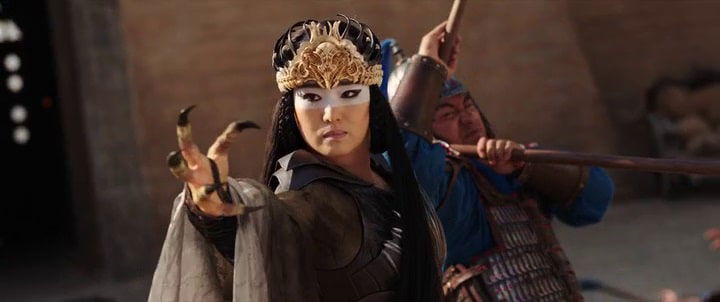
An Amazing Visual Feast
The cinematography in Mulan is an amazing visual feast to watch. The use of bright colors in many scenes, including action scenes, really made a lot of things pop with it comes to a visual style. Adding this to the use of landscapes from a combination of New Zealand and mainland China (Though the choices of where they filmed in China was a bit controversial) really gives Mulan that grand scale mixture of the beauty of the land combined with the snow-white isolation of the mountains that the film needed in the right moments. The same thing within the indoor shots, like the Matchmaker scene where everything does look like it came from the Chinese section of a home decorating store, but looked like it belonged there the whole time.
Another big thing is the fight scenes in Mulan, where they look like something that would have come from the era of Crouching Tiger, Hidden Dragon. While the action comes fast and heavy when it happens, the camera moves around in directions and angles that I’ve never seen in action or martial arts films, including those made in China which are pretty innovative. At times you’ll see the camera angle flip with the person being thrown upside down, giving a really interesting look into the action on screen than a standard filming style does. The only downside is when things go to a grander scope of the army vs army scenes, where the use of CGI to increase numbers would have been of benefit here, but the low grouping to keep things realistic really distracts from the grand nature of these moments.
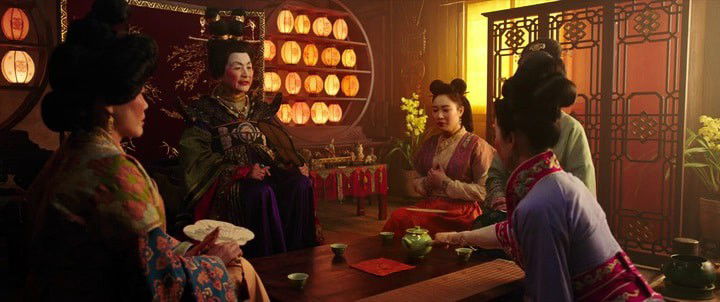
Why change what already worked?
The animated Mulan worked on so many levels when it was released in 1999, it was a combination of a good story, the main character who learns and develops through the movie, a group of comedy characters to help keep the emotions level, a bad guy who was truly scary for the sake of being a bad guy, and visuals that amazed on every level and kept you entertained from beginning to end. This Mulan on the other hand stripped out everything that people enjoyed about the animated version and replaced it with the words “honor” and “Qi” so that it sounds like something that would represent what a Westerner’s version of medieval China was.
While the casting of characters is some of the best and most respectful that we’ve seen in Western media in a long time, casting a lot of Asian based people in the roles, and not just the ones that are more well known in Western media circles even though they did cast them too for some added “star power” when marketing the film in general. However, this has come at the cost of a lot of good actors getting limited roles, limited screen time, or a complete pointless revamp and just using the name only because it was in the animated version of Mulan. A prime example comes from 90% of the cast from the Chinese Army, mainly Chen Honghui (the Li Shang replacement), Ling, Chien-Po, Yao, Cricket, and Hua Zhou.
All of these actors do a good job of being someone for Mulan to interact with, but as the live-action versions of the characters, they fail big time. Hua Zhou should be wiser and more uplifting of Mulan, but comes off as an ass at some points because of the Mulan “Qi” sub-plot. The Ling, Chien-Po, Yao, and Cricket characters were meant to be the comedy relief of the film, but they had everything stripped away in that regard and replaced with a more serious version of the “generic oppressive misogynistic toxic male” trope that is happening more and more with men in Western films. Yao I could understand, but not Ling & Chien-Po who were more loving and somewhat respectful to women, even if they don’t completely treat them as equals. Then there is Chen Honghui, who is more of a secondary antagonist to Mulan, keeping her repressed even as a male, than a love interest which appears out of nowhere in the ending to the film. You can tell that everything done with males in Mulan is done with one thing in mind: Make all men look like evil jackasses.
One of the biggest missteps with Mulan was the removal of Mushu, the loveable dragon played by Eddie Murphy in the animated version. In this version, we see that a Phoenix that represents rebirth and freedom replaces him as the guardian of the Hua family. I’m not sure why they did this outside of the whole “Phoenix represents honor, etc” trope that constantly pops up in Western versions of Chinese culture on film.
But what annoyed me was two things; The first being that the Phoenix was the same colors as Mushu, making it obvious that this was a replacement. The second is that there are too many shots in the film of the Phoenix flying around in front of the camera and in view of Mulan, making it less of a mythical creature is more like a proper character who just doesn’t talk. Hell, the Phoenix doesn’t even actually protect Mulan at all, it just flies around the area watching things happen, which really doesn’t work at all. If you’re going to have a mythical creature who watches over Mulan, have it be in shadow, a brief glimpse at the edge of the eye, that type of thing, not the obvious crap we got here.
Finally, the biggest crime to happen to the cinema… The removal of all the songs. I know that this is meant to be a more realistic and serious version of Mulan, but a lot of the emotion and character from the animated version came from the excellent musical pieces and the musical background score. In this one, we only get to hear something decent at the very end of the film when they use the music from “Reflection” during the scene where Mulan is officially introduced to and rewarded by the Emperor, which is so out of place since the song is meant to be about Mulan looking at herself and wanting to find out who she really is. So out of place. Even in the montage training scene, we didn’t even get an instrumental version of “Make a Man out of you!”? We couldn’t even get that, one of the most popular songs from the original soundtrack!? It just doesn’t make sense at all.
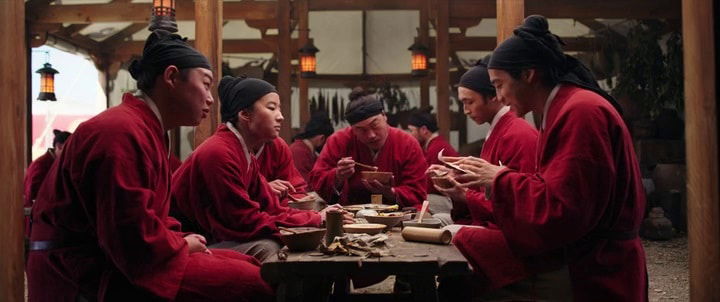
A Hero’s Journey vs A Perfect Hero
One thing that I really want to touch on as to why Mulan just doesn’t work is a concept known as “The Hero’s Journey”. This concept is a simple one, it’s about how the Hero grows and evolves during their journey to become the ultimate force of good in the film. With the animated version, we saw Mulan struggle from the beginning about finding her place in the world, her family, and her future. All of that ties into her journey to take her Father’s place, pretend to be a man, and do what is right by her comrades, the army, and the country.
All leading to her realizing that she is more than one Mulan, she is a mixture of the women, the daughter, the warrior, and the child she was, creating a well-rounded person who saved China by using her wits and brains rather than the muscles that the males were using. Mulan proved her worth by hard work and using her brains, gaining respect from her peers along the way, and then being able to be a standout woman and gaining the honor and respect of the Emperor and a whole nation in the ending.
The live-action version of Mulan is just perfect from the get-go. The opening scene shows a young Mulan using a staff in perfect untrained martial arts practice formations, only for her father to tell her that she has amazing Qi and that in order for her to live in society, she must suppress it and stay hidden from the eyes of others. But Mulan is the perfect martial arts warrior and can’t help herself from doing things like walking on rooftops while chasing chickens, and then flipping and catching a railing with her foot with the perfect balance from the roof. Mulan, as you’ll come to notice, is a perfect warrior and that’s it.
She’s a failure as a “traditional woman” as seen by the Matchmaker (Though this was done to protect her Arachnophobic little sister, who in herself is a complete waste of a character), but also was able to save all the teacups and stuff from breaking by catching it all with her magical martial arts skill. It’s only when she realizes that she has to hide her Qi that thing break. Mulan also has no emotions, perfect for a warrior. In the emotional scene where Mulan cuts off her hair and steals her father’s sword and armor, we get that skipped completely for a short montage of Mulan doing a kata with her father’s sword before leaving her home. No emotion, no nothing but more martial arts warrior stuff. Even in training, she shows that she is many steps above everyone else, but holds back so she won’t be found out… Until her Commander notices her Qi and tells Mulan to let her suppression down and give herself fully to her Qi powers, resulting in SUPER MULAN! Doer of nothing wrong ever! Smartest woman on the planet, the strongest warrior in the universe!
Honestly, I’ve seen better writing and character development in Dragon Ball Z/Super than in Mulan. Mulan is just too perfect, much like watching Rey in the recent Star Wars Trilogy, she is perfection without even trying and does nothing to earn anything. All Mulan has to do is embrace her inner female powers and suddenly she is almost god-like in nature and unbeatable. It’s just dumb writing from a constant need to portray women in movies as “strong and badass” at all times with no flaws so she doesn’t need no man.
But what these writers don’t seem to get is that the journey is what connects us to the character and is also what makes the character badass by the time it’s needed. Showing someone as perfect from the opening scene just leads to boredom from start to finish. It’s the “Superman Effect” where we know that Superman is so overly powerful that he cannot be defeated, thus it makes his fights pointless and boring, same thing here with Mulan, she is so perfect that there is no need for her to join the army or actually do anything since we all know that from scene one that she is going to overcome nothing since she gets no roadblocks and will defeat the bad guy single-handed.
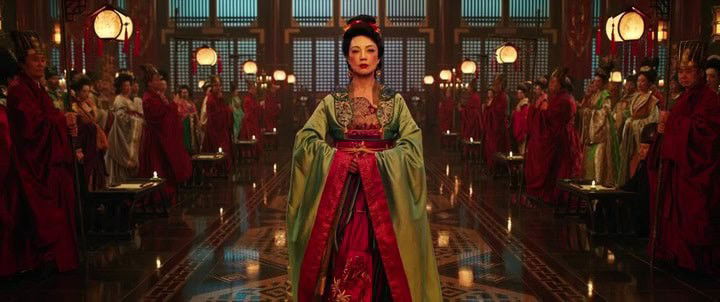
Mulan at its core is what a lot of people think they wanted when reimagining this film, a strong female lead who doesn’t need any male help and will take down the oppressive system that is in place within her culture to elevate herself into a position of honor and power without actually doing anything to earn it but look badass. What we got instead was a film stripped to the bone of what made the animated version it was based on a huge hit worldwide.
Without the comedy, emotion, a hero’s journey, and most of all that classic Disney musical magic, we have a film that is boring and a real insult to women, men, Asian culture, and a wonderful movie that is loved by generations. Disney made the right decision to skip cinema release, but at the same time fucked it up by making Disney+ subscribers pay $30+ for this release. This should have been like Lady & The Tramp remake and just been done as a direct to streaming release… Or better yet, trashed and not released at all.
Summary
Mulan is the remake that should have been done but at the same time should never exist. While there is a lot of credit that needs to be given for using as many Asian or Asian-American actors as possible in the casting, having a female director at the helm about a movie with a strong female lead, it all comes at the cost of everything that made the animated Mulan a classic. The removal of the songs is missed, the comedy is also gone, Mushu is actually missed, and instead of a woman having to give up everything about herself to help her family and grow via many trials is completely removed for a super-powered femme fatal who can do everything perfectly at all times, ruining the story as a whole. There is so much wrong about Mulan that it is a complete bomb of a film, and does dishonor to a great Chinese legend and a great Disney film.
Pros
- Top tier Asian casting
- Amazing locations
- Action sets that are breathtaking
Cons
- No Songs, comedy, or Mushu
- Perfectionist “Mary Sue” lead
- Stinks of “Disneyfication” in action scenes (No blood)


